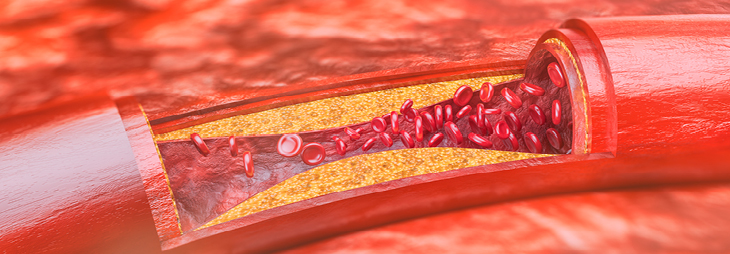
Coronary artery disease is the most common type of heart disease in the United States, with thousands of patients affected every year. Learn more about CAD from our cardiovascular surgery experts by reading below.
What is coronary artery disease?
Coronary artery disease is a progressive thickening of the walls of the blood vessels due to atherosclerosis (deposits of cholesterol, fats and calcium). The thickened wall causes the vessel to narrow, thus decreasing blood flow to heart muscle. This process can be compared to rust and sludge buildup in plumbing.
What causes coronary artery disease?
Some causes have been identified and associated with coronary artery disease. They are classified as changeable and unchangeable risk factors.
Changeable
- Cigarette smoking
- High blood pressure
- High cholesterol
- High glucose levels
- Obesity
- Lack of regular exercise
- Stress
Unchangeable
- Family history of coronary artery disease
- Gender (males are more prone)
- Age
- Diabetes
What are the symptoms of coronary artery disease?
The major symptom of coronary artery disease is angina. Angina occurs due to decreased oxygen to the heart muscle. Everyone can experience angina in a different way. It may be felt as chest pain or pressure that radiates to the neck, jaw or arms; shortness of breath; or indigestion. Usually angina is brought on by exercise, stress or excitement, exposure to the cold, or after eating a heavy meal when the heart must work harder. Angina can occur at rest, which may indicate more serious disease.
Women frequently have different signs of coronary disease than men. They may only notice increasing fatigue, decreasing activity tolerance or toothaches, but these symptoms can be as serious as angina. If the blood flow is severely restricted to an area of the heart muscle, a heart attack (myocardial infarction) may result, which is the death of a portion of the heart muscle. The pain associated with heart attack, unlike that of angina, is not relieved with nitroglycerin and rest.
How is coronary artery disease treated?
Your doctor may recommend heart surgery when the pain or other symptoms are not manageable by medications and lifestyle changes alone. Or, you may have critical narrowing in vessels that diminish the blood flow to a large portion of the heart muscle, placing you at risk for a disabling heart attack.
The surgeon must bypass the obstruction in the artery since it cannot be dissolved or removed. Bypassing the blockages will supply the necessary oxygen, thereby relieving angina and increasing the function of the heart.
At Arkansas Heart Hospital, our cardiovascular surgery team has over 60 years of collective experience and is equipped to perform all kinds of procedures to help patients with coronary artery disease. Learn more about cardiovascular surgery here.